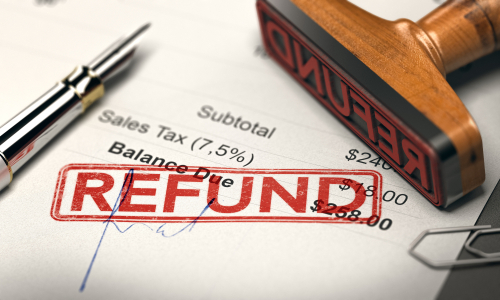Updated by 01.24.2024
When Should a Merchant (Not) Issue a Refund?
As a merchant, you may believe that a refund ought to be offered as often as possible.

Translation: you think that when a customer calls up your customer service department and demands a refund of said customer’s recently paid money, your company is (almost) always in the wrong. Issue it immediately!
Not so fast!
Issuing a refund because the (alleged) customer on the other end of the telephone who is ranting with indignation, or making what sounds like a rational argument, tells you to issue it? Here comes trouble.
We’ve seen a lot of crazy stuff here at E-Complish. We want to share with you our take on times when it’s smart to hesitate and think twice about issuing that refund.
One defrauding method we’ve seen is the “accidental” huge overpayment. It goes something like the following.
A customer calls your business and says that she accidentally used her credit card to pay $10,000 when she owed $100, and she wants the overage refunded to her immediately. (Maybe this customer doesn’t do automatic monthly debiting from her account, so she needs to enter the amount to be paid manually every time the due date comes around).
On the surface, it looks like she was momentarily distracted by her four-year-old or does “fat finger” typing, and by way of a typo entered too many zeros before hitting “enter”. But is that what’s really going on here?
Let’s say that your customer service department goes ahead and authorizes the refund on the overage so that money goes instantly from your merchant account and into the customers. If this is a fraud, that customer then gets on the phone with her bank and disputes they’re allowing the money to be paid to you in the first place. The bank credits her account with (another) $10,000, then opens up a chargeback investigation against your company. Meanwhile, she quickly spends your $9,900.
When she gets found out, not only have you got to jump through hoops to try to get your money back, but you’ve also got a chargeback levied against your company.
In such a scenario, what might your company have done differently? Your customer service department could have tested for fraud in a proactive way. This would have meant offering to help the customer by doing a conference call with her and her bank, to help explain the situation and get the bank to refund her the overage. (That’s really where the money has to come from, anyway.) If she were truly worried about an accidental and huge overage payment, she would be thrilled to have your help getting her money back right away. But, if she balked or refused…you would know that your company was being targeted for fraud.
You may say, “That whole scenario sounds ridiculous. What bank would fall for that?”
You’re right. It is ridiculous. But defrauders know this, and they try this and other con-game deceptions anyway. Even if they only work two percent of the time, they’re adding up to many billions of dollars of merchants’ lost money and mounting chargebacks
There are other scenarios wherein you as a merchant want to have customer service be aware and refuse to give refunds.
What about the one where the customer convinces your company to pay a credit card chargeback, but then requests that the money be refunded back to a different credit card, or by way of a check? That ought to run up a giant red flag. The “customer”, in all probability, has charged a stolen credit card, but wants you to send money to their actual credit card or bank account. This is a clever way of disguising their use of a stolen card. This is why returned funds must always be sent back to the same credit or debit card.
Then there’s one of the so-called “friendly fraud” types, wherein a customer calls up your company and claims that he paid you some money, but actually intended to pay another merchant, and needs a return of the money. This fraud may be attempted in the hope that you give a return and forget to bill him again so that he gets something for nothing from you. But if you return the money back (assuming he really paid it to you, to begin with), he might call his bank and dispute the charge in an attempt to get free money.
Emotional appeals might be made in attempts to con you, too. Yet again, raise the red flags on these. One emotional method is constant harassment through threatening, high-pressure emails or phone calls that demand refunds of payments that were never made. Another one is the “poor me” technique. Here, someone calls your company and spews an elaborate sob story about ruined plans or a canceled credit card, or the inability to help a distressed family member somehow caused by paying your company, and oh won’t you please refund their payment back to them?
In all of these scenarios, you can thwart fraud attempts with some basic, elemental preparation. Letting your customer service department, and your billing department, be made aware of these “fraud dramas” is one giant step toward prevention. They need to be instructed that the customer should always be told to call their bank, instead of your company, about any of these issues. We brought up the proactive customer service method that can be used as well, wherein you offer to help clear up the matter by getting on the phone with the customer’s bank. Defrauders won’t go along with that offer, whereas honest customers with real problems will sing your praises.
Another thing that your customer service should advise people who call about refunds is that electronic check refunds take longer to satisfy than card refunds. This is because the ACH funding process relies heavily on trust and a “pay it in advance” model, wherein a merchant gets paid (in terms of their account getting credited) before a customer’s bank account even gets debited. It makes payment by check a little more cumbersome to process (but the tradeoff is that it’s more secure than paying by credit card).
Getting expert help in thwarting fraud attempts like those described above is another smart reason for a merchant to hire a payments processing solutions specialist. Schedule a consultation to learn more about it.


